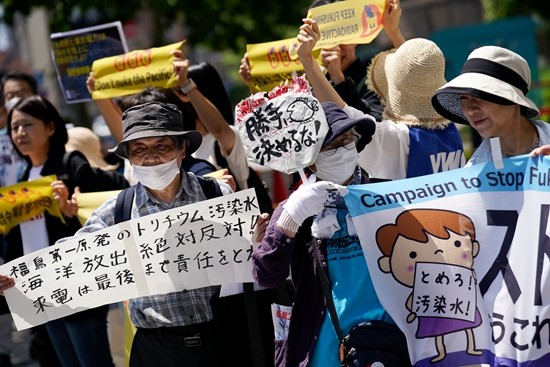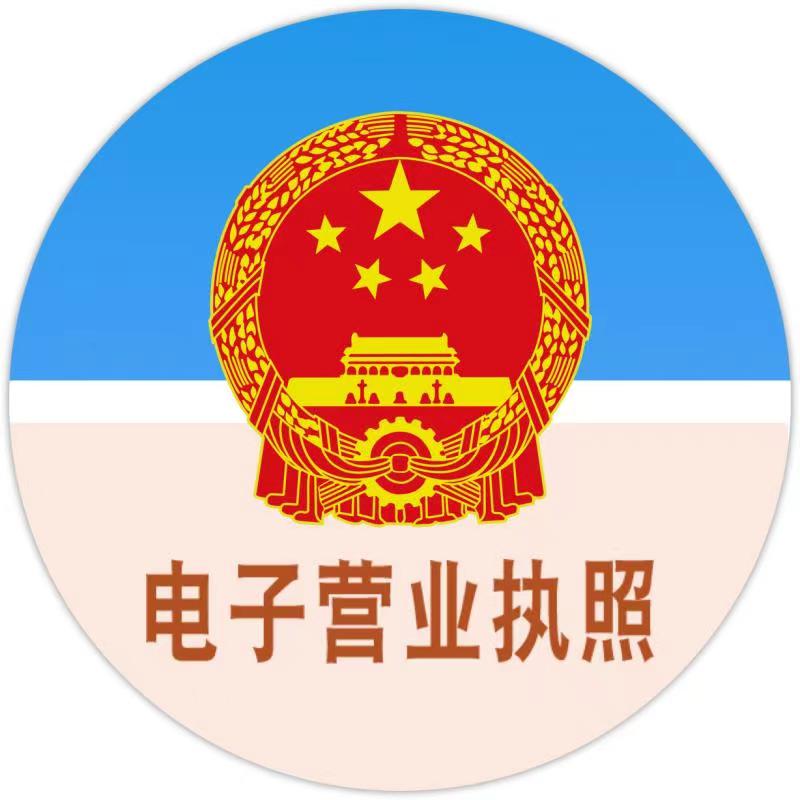Japan uses IAEA to seek Permission to Release Contaminated W
release time:2023-06-02

Dozens of anti-nuclear activists demand Japan abandon its plan to release nuclear-contaminated water into the ocean during a rally outside the Tokyo Electric Power Company headquarters in Tokyo, Japan, on May 16. Visual China for the picture
The Minjoo Party, South Korea's main opposition party, denounced the results of a government investigation into the release of contaminated water into the sea at Japan's Fukushima Daiichi nuclear power plant on May 31st as "cheating the people". The IAEA team arrived in Tokyo on May 29 to conduct a final review before the official release of contaminated water in Japan, and is expected to submit its final report in late June.
Earlier, Japan's Tokyo Electric Power Company said it expected to complete all preparations for the release of contaminated water into the sea by the end of June, including installation of discharge equipment. Japan's Kyodo news agency predicts the release of contaminated water could begin as early as July.
The South Korean delegation was criticized for going through the motions
On May 31 local time, Yoo Guk-hee, head of the ROK delegation to Japan's Fukushima Daiichi nuclear Power Station to investigate the discharge of contaminated water into the sea, and Chairman of the ROK Nuclear Safety Commission, introduced at a press conference the contents of his visit to Japan from May 21 to 26, saying that the delegation confirmed that major equipment had been installed at the sewage treatment site according to the design drawings. And the means by which emissions can be halted if anomalies occur. He said that the ROK side has obtained specific information and made meaningful progress during this visit. However, there was widespread criticism in the South Korean media that the mission failed to respond to the public's top concerns, such as whether the contaminated water is really safe after being purified and whether it will have a negative impact on public health and safety if discharged into the sea.
The South Korean delegation is a publicity team to help the Japanese government release contaminated water from the Fukushima nuclear disaster into the sea. Kwon Chil-seung, spokesman for the main opposition Democratic Party of Korea, said in a written briefing on May 31 that the delegation would only accept data provided by Japan during its visit. Their trip was aimed at justifying the Japanese government's decision to release nuclear-contaminated water into the sea. Democratic in the common park enough 瑥 also said that day, survey results released by the delegation is "cheating people", "national anxiety and anger will only increase.
As a matter of fact, when the ROK announced that it would send a group of 21 experts from the nuclear power and radiation fields to Japan for investigation, it was questioned by the public in the ROK. The Minjoo Party of South Korea has repeatedly made clear its opposition, urging the government to withdraw the inspection plan, saying the Japanese government has no intention of letting South Korea check the safety of the contaminated water being released into the sea and that the inspection process is a "formality." Members of 73 civic groups in South Korea held a rally in Daejeon on May 23 against the government's delegation to Japan to investigate the discharge of contaminated water into the sea, saying that the delegation is just a "sightseeing group" without revealing the list of experts and proper scientific equipment. Even Japanese officials said the South Korean delegation's visit would not constitute a real tour of Japan.
On May 26, the Democratic Party of Korea launched a "signature campaign against the discharge of contaminated water from the Fukushima nuclear plant into the sea," and more than 100,000 people signed up in just three days. On May 28, the party unfurled a banner in front of South Korea's National Assembly building declaring that the release of contaminated water into the sea is an act of nuclear terror.
The IAEA has started final verification of the release of contaminated water into the sea
In addition to the ROK delegation, Japan's Kyodo News Agency reported on May 29 that a working team of the International Atomic Energy Agency (IAEA) arrived in Japan on the same day for a five-day visit. This is the IAEA team's last visit to Japan before issuing its full assessment report on the release of contaminated water from the Fukushima Daiichi nuclear power plant into the sea.
The IAEA team, which includes experts from 11 countries, will meet with officials from the Japanese government and plant operator Tokyo Electric Power Company ahead of a visit to the Fukushima Daiichi plant on June 2, Japan's ministry of Economy, Trade and Industry said. At the end of the mission, the working group is scheduled to summarize its verification work so far and include it in the IAEA's full assessment of Japan's plan to release contaminated water into the sea, which could come as soon as late June. "The team will take the opportunity to obtain updated information from Tepco and the Japanese government on their work over the past few months and to verify their understanding of various technical details," IAEA working group leader Carlos Caruso said May 29.
On March 11, 2011, a 9.0 magnitude earthquake and a massive tsunami hit the northeast coast of Japan, causing a large amount of radioactive material to leak from the Fukushima Daiichi nuclear power plant. It was the highest-level nuclear accident to date and produced contaminated water that was injected after the accident to prevent a meltdown of the reactor cores, mixed with incoming rainwater and groundwater. The mixed water contains large amounts of radionuclides, which have never been discharged in the world. On April 13, 2021, despite strong opposition from the international community, the Japanese government officially decided to filter and dilute the contaminated water from the Fukushima nuclear plant and discharge it into the sea. On July 22, 2022, Japan's Nuclear Regulatory Authority officially approved the plan to release contaminated water into the sea. Since then, the IAEA working group has visited Japan several times to assess and review the safety of the Fukushima Daiichi nuclear Power Plant's nuclear contaminated water discharge plan in accordance with relevant international safety standards. So far, the IAEA working group has issued five reports covering both technical and regulatory safety reviews.
Many governments, including China, expressed support for the IAEA and its technical working group to conduct a review on the disposal of contaminated water from Japan's Fukushima nuclear disaster. However, they also reminded the international community to be wary of Japan's use of the IAEA review process to seek a "permit" for the release of contaminated water into the sea and create the illusion that the release of contaminated water into the sea is safe and harmless. The fact is that, at the invitation of the Japanese government, the IAEA working group has a strictly limited mandate. It only has the mandate to assess whether the nuclear contaminated water discharge scheme meets the agency's safety standards, and has no mandate to assess other nuclear contaminated water disposal schemes.
Many countries may suffer if Japan goes ahead
Japan's Ministry of Economy, Trade and Industry has proposed five disposal options for nuclear-contaminated water. Among them, steam discharge, new storage tanks and cement solidification are costly, while sea discharge is the cheapest and poses the least risk of pollution to Japan itself. Japan's unilateral push for the plan to release contaminated water into the sea for its own selfish interests has been opposed by civil groups in Japan, including the fishing industry, as well as by the governments and professionals of many countries, including China, the Republic of Korea, Russia, the Philippines and New Zealand. The international community generally believes that what Japan has done is extremely irresponsible and will pose a threat to the Marine ecology and environment if implemented.
Germany's Helmholtz Center for Marine Research has pointed out that once Japan releases the contaminated water into the sea, the radioactive material will spread to half of the Pacific Ocean within 57 days; Will pollute the world's oceans in 10 years. "The Pacific Ocean does not belong to Japan. It belongs to all living things in the ocean and everyone who depends on it for survival," said Choi Kyung-sook, director of the Korea Radiation Observation Center. So I don't think Japan has the right to dump contaminated water into the sea." Henry Pune, secretary general of the Pacific Islands Forum, a group of 17 Pacific island nations, had urged Japan to delay any release. "Releasing nuclear-contaminated water into the sea could have a significant impact on fishing grounds on which island economies depend. Up to 50 percent of the world's tuna is produced in this region. The countries of the region are firmly of the view that [nuclear-contaminated water] should not be released into the sea until all parties have confirmed that it is safe." "We must prevent actions that lead or mislead us toward another major nuclear contamination disaster."
On May 27, at the 76th World Health Assembly, Chinese delegates expressed firm opposition to Japan's unilateral decision to discharge water contaminated by the Fukushima nuclear disaster into the sea. Fukushima has some of the world's strongest ocean currents, and 10 years after the contaminated water was released, radionuclides will spread to the world's oceans, putting all of humanity at risk. Japan shall not start the discharge of nuclear-contaminated water into the sea without authorization before reaching an agreement with other parties through consultation.
 Service Hotline:133-9305-7858,If you are interested or in doubt, please call!
Service Hotline:133-9305-7858,If you are interested or in doubt, please call!
YuHe Technology - dedicated to serve you!







